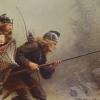This year, half of the world's population will go to the polls. This makes 2024 the biggest election year in history.
In more than 60 countries, politicians will compete for the people's votes. This will be done with a variety of tools, and conveying stories is one of the most important. Not just stories about the present and the political situation, but also about history itself.
For example, politicians may talk about a nation's great past to illustrate their visions for the future. Or they might tell how bad it was before, to legitimise political measures.
Prominent examples on the world stage include Donald Trump, who has established an entire movement with his slogan "Make America Great Again," and Vladimir Putin, who talks about "de-nazification" to legitimise the war against Ukraine.
Here in the Nordics, the past is also used politically. But exactly how, and by whom, has not been systematically investigated. A group of researchers from Denmark, Finland, Norway, and Sweden has set out to do something about this knowledge gap. In the PastForward project, they will examine how the past is used politically in the digital sphere to imagine and shape national and Nordic futures.

The past is political: Facebook posters from the Swedish parties the Social Democratic Party, the Moderate Party and the Sweden Democrats invoke the Holocaust, the communist East Germany and Sweden's "safe past" to appeal to voters.
The whole political spectrum
Project leader Manuel Menke states that they are aiming at examining the entire political spectrum.
“One of the original aspects of this project is that it doesn't only focus on populist right-wing parties. We've observed their propensity to draw from the past and wish to reinstate certain elements of it in the future. This has generated significant interest among researchers, not solely because of how these politicians are using history, but also due to the perceived threat to democracy this represents. Hence, the idea was to expand our scope and ask: what about the other parties? Do they adopt some of these strategies? How does the past play a role for more mainstream parties compared to the extreme ones?”
Menke suggests that political parties often exploit history negatively, and a part of the project's aim is to explore if there's a more positive utilisation of the past.
“We've noted that right-wing communication essentially abuses the notion of a populace needing protection, usually hinging on ethnicity. Thus, many narratives about the past tend to be exclusionary. When examining other parties, we inquire if there are more positive interpretations of history that champion our heritage of equality and democratic traditions, utilising the past in ways that are more productive than merely as a retreat from modern, multi-ethnic societies and so forth.”

Researching social media: Manuel Menke, project leader of PastForward and Associate Professor at the Department of Communication, University of Copenhagen.
Narratives shape society
Menke stresses that when politicians invoke history, it's less about factual accuracy and more about shaping a specific reality.
“Our primary interest lies in the strategic use of the past and how these narratives are crafted with a particular objective. Politicians mould the past in specific ways, tailored to the audience they aim to appeal to, and the future they promise. A key takeaway in dealing with history is that it's not just about recalling the past but understanding its implications for the present.”
“What politicians strive to do is essentially forge a connection between them and their electorate, seeking to create communities that align with their vision. The national context is crucial here. It's not merely about fostering a sense of national belonging; it's deeply intertwined with how we relate our present to our national history, whether it involves revisiting historical epochs like the Viking Age or embracing the grassroots memories passed down through generations, intertwining these narratives with our current societal fabric.”
Social media is crucial
Menke believes it's essential to focus on established social media platforms.
“Social media has become a pivotal channel for political discourse. Our research will concentrate on Facebook and X, as these platforms are where parties predominantly engage. While some utilise Instagram and TikTok, in the Nordic regions, Facebook is a primary platform for the general populace, with X predominantly targeting a more elite audience including experts, journalists, and other politicians. Each platform caters to distinct demographic groups.”
The team will investigate the content and discussions generated by party leaders and official accounts.
“We aim to understand how the public responds to parties and leaders discussing the past. What kinds of discourse emerge? Are there detractors or supporters of these historical interpretations? Essentially, we're interested in the vibrancy and nature of the debate surrounding these historical narratives.”
The rise of social media has expedited the formation of a post-factual society, where misinformation can spread rapidly, exacerbating polarisation and radicalisation, particularly in political contexts. This phenomenon is another focal point of the project.
“The political polarisation we witness is troubling. Therefore, our project also emphasises the broader implications for democracy, exploring how questions of polarisation and social cohesion relate to dominant narratives of the past. Identifying who is included or excluded and how a society can collectively progress is central to our research.”
This research is expected to be valuable not just to academics in media and politics but especially to the broader public targeted by the communication about the past during election campaigns. Results might also be relevant to Nordic politicians, albeit with some reservations from Menke. “We anticipate that politicians will find our findings intriguing. However, there's always the challenge of balancing their interest in leveraging our insights for strategic purposes against the responsibility of using history thoughtfully. Our hope is that our research will ultimately guide politicians towards a more conscientious employment of historical narratives, recognising their profound impact on society's emotional landscape and its social cohesion.”
About the project
Project: PastForward: The political uses of the past in digital discourses about Nordic futures
Duration: 2023–2026
Funded by NordForsk through NOS-HS Project Grants.
Participating institutions: University of Copenhagen (Denmark), OsloMet University (Norway), University of Helsinki (Finland) and Umeå University (Sweden).


